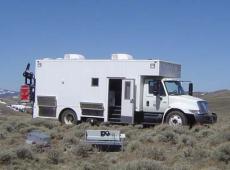Biomass burning releases considerable amounts of carbonaceous aerosols and greenhouse gases into the atmosphere, significantly impacting air quality. Field measurement of fresh smoke is important in determining key physical and optical properties and emission rates.
The Fire Sciences Lab has developed a mobile lab that provides a platform from which to operate a variety of particulate and gas analyzing instruments at remote fire locations.
Land management agencies need rigorously tested, accurate models to quantify the contribution of fire emissions to air pollution and visibility impairment. Accurately describing and predicting the dynamics of smoke plumes and subsequent aerosol and gas transport is a major uncertainty in determining the impact of fire emissions on air quality. Ground based instruments are deployed to remote fires to acquire measurements of smoke plume dynamics, smoke aerosol distribution and meteorological conditions in, and around, the plumes of active wildland fire events. Measurement results are used to quantitatively evaluate plume rise models and the high-resolution smoke dispersion and air quality forecasting capabilities of our Weather Research and Forecasting – Smoke Dispersion (WRF-SD) modeling system.
